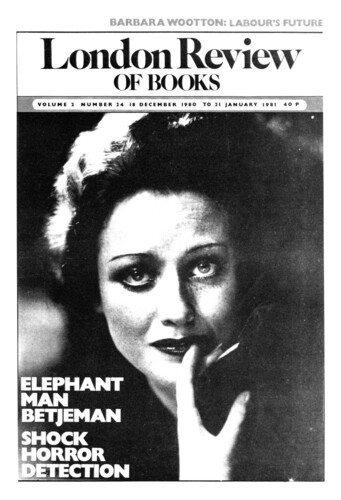A good many years ago the late Sir John Masterman, when Provost of Worcester College, had the idea of creating a species of Sherlock Holmes Apocrypha. He wrote two or three short stories which appeared, I think, in an evening newspaper. I myself can recall nothing of them except a little joke. In the course of investigating a case of poisoning. Holmes has occasion to say to his old friend: ‘Alimentary, my dear Watson.’ The project came to a hall when Sir John was gently made aware of the fact that the name and character of the great detective constituted a copyright owned by the Conan Doyle estate. But now fifty years have elapsed since Conan Doyle’s death, and anybody that pleases can have a go at a Holmes story. The present example is perhaps most kindly described as extremely odd. In addition to Holmes and Watson the main characters are Bertrand Russell, Ludwig Wittgenstein, A.N. Whitehead. J.M. Keynes and G.E. Moore. Rather in the role of what are coming to be known as ‘guest artists’, room is also found for Lytton Strachey and Virginia Woolf. All these, together with Annie Besant, turn out to be goodies or near goodies, and over against them, as chief baddy, is Aleister Crowley, variously described as ‘the high priest of post-Edwardian mysticism’ and ‘the wickedest man in England’.
The action begins when Holmes has ‘tossed a telegram across the breakfast table’ to Watson. It reads: ‘A GREAT MIND IS BEING STOLEN. PLEASE COME AT ONCE. RUSSELL, TRINITY COLLEGE, CAMBRIDGE.’ Holmes obligingly does come at once, and amid detailed descriptions of that most august of learned foundations the various academics dodge around, making, like the equally historical characters rampant in Max Beerbohm’s ‘Savonarola’ Brown, ‘remarks highly characteristic of themselves’. Wittgenstein, despite having had his mind purloined by some evil magic, actually contrives to say: ‘Whereof one cannot speak, thereof one must keep silent.’ Moore ‘follows rather closely his own line of argument printed in Principia Ethica’. And Russell (who at one point is visited in prison by Holmes and Keynes) is recalled in a footnote – oh, surprise, surprise! – as asking: ‘Is the class of all classes which are not members of themselves a member of itself? If yes, no; if no, yes.’
Randall Collins (PhD) is showing us that he knows his stuff. Yet he might with advantage, I believe, have betaken himself from Cambridge’s Trinity to Oxford’s Christ Church, and at the same time to persons living in a period a little more decently removed from our own. In a chapter called ‘Alice’s Wonderland Garden’ this possibility is at least glanced at, and a Cambridge mathematician, G.H. Hardy, utters (and behaves with a cricket bat) in a manner successfully evoking the authentic Lewis Carroll world. But aside from this, Dr Collins’s ‘caper’, as his publishers call it, is not very amusing. Trinity’s Apostles (frequently mentioned) would not have thought highly of so laboured an extravaganza.
Send Letters To:
The Editor
London Review of Books,
28 Little Russell Street
London, WC1A 2HN
letters@lrb.co.uk
Please include name, address, and a telephone number.

